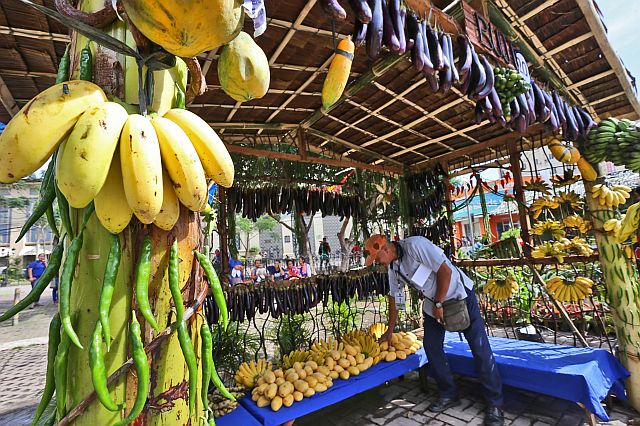
The fruit export sector is expected to grow further next year as exporters explore opportunities in the China market.
CDN PHOTO/JUNJIE MENDOZA
The Philippines’ warmer relation with China has gotten export players in Cebu more bullish for what’s in store for the industry in 2018.
Federico Escalona, executive director at the Philippine Exporters Confederation, Inc. (Philexport) in Cebu, said that aside from the export sector’s positive performance since January this year, China’s commitment to import more products from the Philippines is also another reason he is optimistic about the industry moving forward.
“China made promises this year, but all of that will become a reality starting next year,” he said in an interview.
P1.7B purchase
In March this year, 18 Chinese firms made a purchasing order for $1.7 billion worth of Philippine products which covers coconut oil, banana, pineapple, mango, nickel and copper, among others.
The purchase agreement came more than a week after the 28th Philippines-China Joint Commission on Economic and Trade Cooperation meeting, the first after a five-year hiatus as tensions escalated over the West Philippine Sea territorial dispute.
According to Chinese Ambassador to the Philippines Zhao Jianhua, this would be the first among many similar agreements in the future.
Aside from this agreement, he said that China had already brought $100 million worth of Philippine fruits since President Rodrigo Duterte’s visit to the once-estranged ally in October 2016.
CIIE
Escalona said something he looks forward to next year is the China International Import Expo (CIIE), China’s first and biggest government-initiated expo, to be held on Nov. 5 to 10 in Shanghai.
The activity will feature two exhibitions, including one on the Belt and Road countries’ trade and investment, their goods and services, tourism and featured products, while the other will be on varied business sectors such as consumer electronics, auto, clothing, food, medical equipment, service outsourcing and education.
State leaders
Next year’s CIIE will be attended by state leaders, ministers, heads of international organizations, business representatives and academic scholars.
Hosted by the Chinese Ministry of Commerce and the Shanghai Municipal Peoples’ Government, the CIIE was created following Chinese President Xi Jinping’s announcement that the republic will hold the import expo starting next year during the opening ceremony of the two-day Belt and Road Forum.
Escalona said he hopes they will be able to send a delegation to the event next year.
“We have already sent an e-mail blast to our members. This is not only for Cebu, but for all 19 chapters of Philexport,” Escalona said.
To date, Philexport in Cebu has 380 members, including manufacturers of gifts, decor and housewares, as well as furniture and processed food.
Escalona said the expo can be an avenue for Philippine exporters to collaborate with other players from the region, whether as potential partners or simply learning catalysts for best practices.
Momentum
According to the business leader, local export players have felt that the sector has been recovering, albeit slowly, and that the momentum is there, although there are also a number of issues some are still wary about.
The Department of Trade and Industry (DTI), through its Export Marketing Bureau (EMB), said in a statement that it sees solid growth for Philippine merchandise exports this year as it continues to expand by 11.68 percent with total sales of $53.11 billion between January to October 2017 compared to the same period last year with a total of only $47.55 billion in export sales.
In the last 10 months, the value of merchandise exports in the covered period was shared almost evenly by electronics and non-electronics at 50.78 percent and 49.22 percent, respectively.
October growth
According to a preliminary report from the Philippine Statistics Authority (PSA), year-on-year growth for October 2017 showed the country’s export sales increased by 6.6 percent to $5.37 billion from $5.04 billion last year, supported by double-digit growths in six out of the top ten major Philippine exports.
Among the gainers for the review period in terms of export sales are gold, electronic equipment and parts, metal components, fresh bananas, other mineral products and electronic products.
“Export sector is a big employment generator and we welcome these positive developments as this will translate to more job opportunities,” DTI Undersecretary for Trade and Investments Promotion Group Nora Terrado said in a statement.
Top exporter
Japan is still the top export destination for October 2017 with total exports receipts of $871.36 million and a share of 16.2 percent in total exports.
“Japan is a significant trading partner for the Philippines. We are maximizing good relations that we have with them by introducing and increasing awareness of various design-driven products and services that we can export,” said Terrado.
“We are also seeking new markets while we continue to expand our exports to existing trading partners. DTI continues to apply new approaches and strategies based on trends and changing consumer landscape,” she added.
China and Hong Kong
Meanwhile, the leading destination of PH merchandise exports for the first ten months of the year was still the combined markets of China and Hong Kong, with shipments to this combined markets with a share of 24.31 percent increasing by 22.10 percent in value.
By regional bloc, East Asia remains the top regional export destination for Philippine merchandise exports comprising for 51 percent share in total exports sales while Asean ranked second with 16 percent share for the month of October 2017.
Exports to the European Union remain rosy with total sales of $677.94, up from $549.20 million in October 2016.
Recently, DTI unveiled the Inclusive Innovation Industrial Strategy or i3s that aims to grow and develop globally competitive and innovative industries.